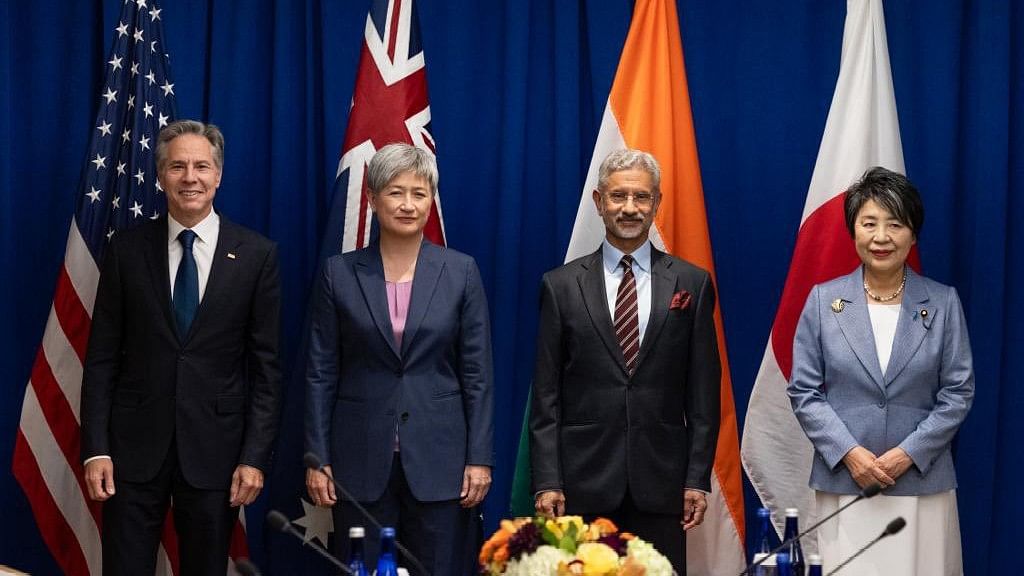
EAM Jaishankar with representatives of the Quad countries, namely Yoko Kamikawa, Penny Wong and Antony Blinken.
Credit: X/ @DrSJaishankar
After persuading the West to accept the G20 Delhi Declaration without a word of condemnation for Russia for its military aggression against Ukraine, India has joined the United States, Japan and Australia to tacitly ask Russia to refrain from clinching any arms transfer deal with North Korea.
The foreign ministers of Quad – a four-nation coalition comprising India, Japan, Australia and the United States – sent out a message to Russia, urging all member states of the United States to abide by the Security Council resolutions prohibiting “the transfer to North Korea or procurement from North Korea of all arms and related materiel”.
External Affairs Minister S Jaishankar joined his Japanese, Australian and American counterparts, Yoko Kamikawa, Penny Wong and Antony Blinken, for a meeting of the Quad on the sideline of the United Nations General Assembly (UNGA).
A joint statement issued after the meeting condemned North Korea’s destabilizing launches using ballistic missile technology and its continued pursuit of nuclear weapons in violation of multiple UN Security Council resolutions. “We reaffirm our commitment to the complete denuclearization of North Korea consistent with UNSCRs, and we urge North Korea to abide by all its obligations under the UNSCRs and engage in substantive dialogue,” the Quad foreign ministers stated. They stressed the importance of addressing the proliferation of nuclear and missile technologies related to North Korea in the region and beyond.
North Korea’s leader Kim Jong Un recently made a rare weeklong visit to Russia and had a meeting with the president of the former Soviet Union nation Vladimir Putin.
The two leaders discussed ‘possibilities’ for military cooperation. The US-led West as well as South Korea expressed concern over the possibility that the Kim-Putin meeting might lead to Russia procuring ammunition from North Korea to replenish its stock, which was depleting fast in the past 19 months since it launched “special military operations” in Ukraine.
North Korea has long been under the UN Security Council’s sanctions.
The US and the European Union (EU) also imposed sanctions on Russia in response to its military aggression against Ukraine.
New Delhi has been drawing flak from the West for not joining the US and others in condemning Russia for its aggression against Ukraine. It refrained from criticising Moscow, apparently in view of its deep Cold War era ties with Russia, particularly its decades-old dependence on the former Soviet Union nation for defence equipment, including high-tech military hardware. India has also been circumventing sanctions imposed by the US and other western nations on Russia and continuing bilateral trade. It has also increased oil and coal imports from Russia.
India earlier this month persuaded the United States and the rest of the West to accept at the 18th G20 summit in New Delhi a declaration that refrained from condemning Russia for its war against Ukraine.
New Delhi, however, also shares the concerns of the US and others over the possibility of an arms transfer deal between Russia and North Korea.
India has since long been concerned over North Korea's clandestine defence technology cooperation with Pakistan. New Delhi, according to the sources, suspects that Pyongyang-Islamabad secret defence cooperation, which in the mid-1990s led to the supply of Rodong Missiles and technology to Pakistan, is still continuing. Abdul Qadeer Khan, the founder of the nuclear program of Pakistan, was in 2003 found to have traded know-how and technology with Iran, Libya and North Korea. Khan in 2011 made public documents in support of his claim that North Korea had bribed senior officials of the Pakistani Army and got them to allow him to share nuclear technology and certain equipment with the pariah nation.
New Delhi earlier conveyed to Moscow its concerns over Russia’s keenness to expand defence cooperation with Pakistan, apparently in response to the deepening India-US military ties and strategic convergence in the Indo-Pacific region.
